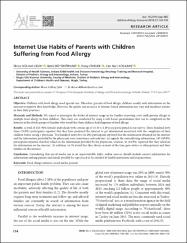Internet Use Habits of Parents with Children Suffering from Food Allergy
Abstract
Objective: Children with food allergy need special care. Therefore, parents of food allergic children usually seek information on the internet to improve their knowledge. However, the quality and accuracy of internet-based information may vary and misdirect parents in their daily practices. Materials and Methods: We aimed to investigate the habits of internet usage in the families reporting cow's milk protein allergy or multiple food allergy in their children. This study was conducted by using a web-based questionnaire that can be completed on the Internet in Facebook groups of families who stated that their children had diagnosis of food allergy. Results: A total of 458 (96% female) individuals with a mean age of 32.03 +/- 4.49 years participated in our survey. Three hundred forty three (74.9%) participants reported that they have preferred the internet to get information associated with the complaints of their children before seeing a physician. Two hundred ninty five (64.4%) participants reported that the information obtained on the internet and the information provided by the physicians were sometimes contradictory. As regards the contradicting information, 147 (49.8%) participants reported that they relied on the information provided by the physicians, whereas, 43 (14.9%) reported that they relied on the information on the internet. In addition, 44.3% stated that they always or most of the time gave advice to other patients and their families on the internet. Conclusion: Considering that social media use is an unpreventable habit, online sources should include correct information for information-seeking parents and should possibly be supervised or be certified by health institutions and organizations.
Source
Astim Allerji ImmunolojiVolume
17Issue
3URI
https://doi.org/10.21911/aai.485https://app.trdizin.gov.tr//makale/TXpZd05URXlNZz09
https://hdl.handle.net/20.500.12809/1142


















